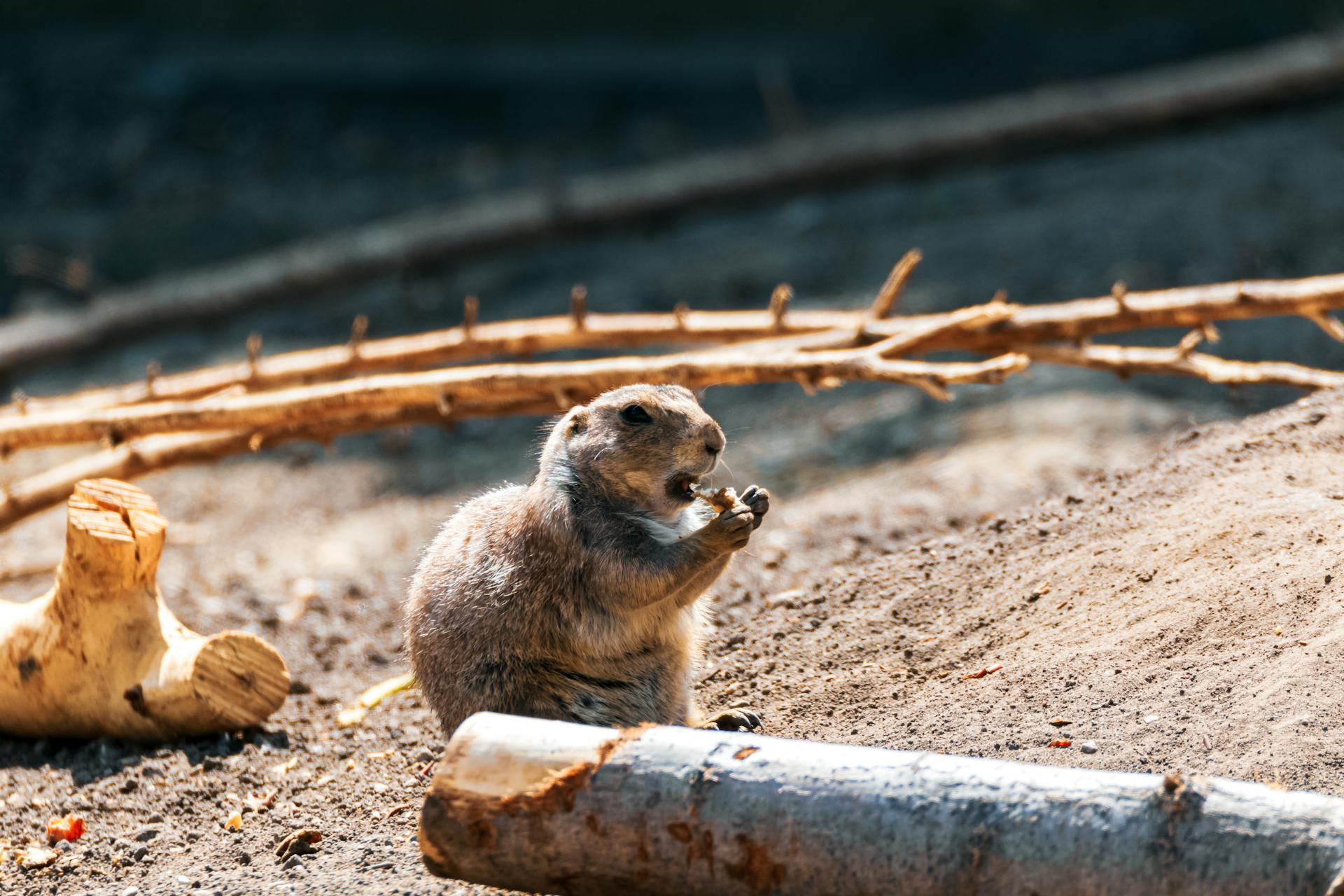
Dogs eating dirt, also known as pica, is a common behavior in canines. Pica is often associated with nutritional deficiencies or gastrointestinal issues.
Some dogs may eat dirt due to a lack of essential minerals in their diet. For example, a dog may eat dirt to supplement its calcium intake if its food is lacking in this nutrient.
Dogs may also eat dirt due to boredom or stress. A study found that dogs that were left alone for extended periods of time were more likely to engage in pica behavior.
Eating dirt can be a sign of underlying health issues, such as gastrointestinal problems or allergies.
Check this out: Do Dogs Eat Dead Animals
Why Do Dogs Eat Dirt?
Dogs eat dirt for various reasons, including seeking minerals, alleviating gastrointestinal discomfort, exploring scents and flavors, or simply out of boredom.
Some common causes of a dog's desire to eat dirt include nutritional, behavioral, or medical reasons. This can be a sign of a bigger issue, such as anemia, nutritional imbalances or deficiencies, especially in minerals, low-quality food, upset stomach, or gastrointestinal disturbance.
Consider reading: Flea Dirt on Dog
Stress or boredom can lead to eating all sorts of things, including dirt. If your dog is continually eating dirt, you shouldn't discount this behavior.
Some possible reasons your dog may be eating dirt include:
- Nutritional Deficiency: A lack of certain essential minerals and nutrients in their diet can lead to some dogs seeking out alternate sources of nutrition, including dirt.
- Boredom: Dogs can get bored, just like humans can. Digging in and eating dirt may be a way they seek to entertain themselves.
- Exploration: Dogs use their noses and mouths to explore the world around them. They may just find the dirt to be something interesting in their environment.
- Pica Behavior: Pica is a behavioral condition in which a dog eats items that are not food. Dirt could be one of these non-food items.
- Instinctive Behavior: Dogs may have an instinct to eat dirt because of a natural behavior to seek out minerals that may be contained in it as wolves might do in the wild.
- Scent: Dogs see much of the world through their noses, so if something in the dirt smells good, they may try to eat it.
- Medical Issues: Medical conditions like gastrointestinal problems or parasites might lead a dog to eat dirt.
It's worth noting that if your dog is eating dirt frequently, intensely, or in large quantities, it's time to go to the vet. Changes in stool or bloodwork to look for underlying abnormalities may also be helpful in pinpointing a cause.
Is Eating Dirt Bad for Dogs?
Eating dirt can be a big problem for dogs. Ingesting small amounts is generally not harmful, but large quantities or contaminated soil can lead to gastrointestinal upset.
Dogs may eat dirt for various reasons, but it's essential to address the issue promptly. If you notice your dog eating dirt, monitor their behavior and consult a vet if you have concerns.
Ingesting contaminated soil can expose dogs to harmful substances. You should be aware of the risks of eating dirt or grass, especially if it may contain pesticides, fertilizers, or other toxins.
For another approach, see: Horse Eating Dirt
These toxins can be severely harmful to your dog and may even reach toxic levels if enough dirt is ingested. If you suspect your dog has eaten contaminated soil, call the Pet Poison Helpline immediately.
Continual dirt eating can lead to serious health issues. The main risk is impaction of the intestine, which can cause hardened stool to get stuck in the body due to long-term constipation.
How to Prevent Dogs from Eating Dirt
Providing a balanced diet is crucial to prevent dogs from eating dirt. A high-quality dog food can help address nutritional deficiencies that may be causing pica behavior.
Consult with your veterinarian to rule out any underlying medical conditions that may be causing your dog to eat dirt excessively. This is especially important if your dog is eating dirt due to a nutritional imbalance.
Dogs need plenty of mental and physical stimulation to prevent boredom and anxiety, which can lead to dirt eating. Make sure your dog is getting enough exercise and enrichment to keep them occupied.
Using deterrents such as bitter sprays can help discourage your dog from eating dirt. These sprays have a bitter taste that most dogs find unpleasant, and can be sprayed on areas where your dog is most likely to eat dirt.
Dogs with separation anxiety may eat dirt due to stress when they are separated from their pet parents. Providing a stable and loving environment can help alleviate this anxiety.
Pica behavior, which includes eating non-food items like dirt, can be caused by a variety of factors, including stress, anxiety, boredom, and nutritional deficiencies. Consult with your veterinarian to rule out any underlying medical conditions and work with them to develop a plan to address this behavior.
See what others are reading: Alpha Canine Behavior
What to Do If Your Dog Eats Dirt
If your dog is eating dirt, it's essential to rule out a medical issue. You may not know that dirt can be soothing too, but if your dog is frequently eating dirt after meals, consider trying a new diet or implementing a digestive aid.
You should be concerned if your dog's dirt-eating becomes compulsive and frequent, or if they show signs of illness or discomfort like vomiting, diarrhea, or lethargy. If your dog isn't acting healthy, then consult with your veterinarian.
Take your dog to the vet to book an appointment outside of your regular vet visits to make sure they aren’t ill. If your dog has suddenly changed their behavior, it's crucial to rule out a medical issue.
If you observe persistent or concerning dirt-eating behavior in your dog, it's crucial to consult with a veterinarian. They can conduct a thorough examination, run diagnostic tests, and determine if there's an underlying medical condition contributing to the behavior.
You should visit the vet if you notice your dog eating dirt excessively. Your vet can rule out any underlying medical conditions that may be causing the behavior.
If you're unsure about your dog's dirt-eating behavior, don't hesitate to contact your vet. They can provide guidance and support to help you address the issue.
Here's an interesting read: Certified Canine Behavior Consultant
Medical Conditions
Dogs eating dirt can be a sign of an underlying medical condition. Some common medical conditions that can cause this behavior include anemia, gastrointestinal disorders, parasites, pancreatitis, liver disease, exocrine pancreatic insufficiency, diabetes, and thyroid issues.
Anemia is a condition that causes a lack of red blood cells, which can lead to a decrease in the amount of oxygen that can be carried throughout the body. According to Dr. Coates, anemia is one of the medical conditions that can cause dogs to eat dirt.
Gastrointestinal disorders, such as inflammatory bowel disease (IBD), gastritis, or other gastrointestinal issues, can lead to discomfort and prompt a dog to seek relief by eating unusual substances, including dirt. Intestinal parasites, such as worms, can also cause irritation and discomfort in a dog's digestive system.
Pancreatitis, an inflammation of the pancreas, can cause digestive upset and may influence a dog's eating habits. Liver disease can impact a dog's appetite and behavior, potentially leading them to eat dirt.
Here's an interesting read: Pancreatitis in Dogs Not Eating
Exocrine pancreatic insufficiency (EPI) is a condition where the pancreas doesn't produce enough enzymes for proper digestion, leading to malabsorption of nutrients and potential dirt-eating behavior. Diabetes can also cause changes in appetite and eating habits, which could include eating dirt.
If your dog is eating dirt excessively or seems to be in distress, it's essential to consult with your veterinarian to rule out any underlying medical conditions. They will develop a treatment plan to address the underlying issue.
Here are some medical conditions that can cause dogs to eat dirt:
- Anemia
- Gastrointestinal disorders (e.g., IBD, gastritis)
- Parasites (e.g., worms)
- Pancreatitis
- Liver disease
- Exocrine pancreatic insufficiency (EPI)
- Diabetes
- Thyroid issues
Frequently Asked Questions
What minerals are dogs lacking when they eat dirt?
Dogs may be lacking essential minerals like calcium, magnesium, sodium, and potassium when they eat dirt. This could be a sign of an underlying nutritional issue, such as underfeeding or hunger.
What vitamins are dogs lacking when they eat dirt?
Dogs may be lacking essential nutrients like calcium, iron, and other trace minerals when they eat dirt. This could be due to an imbalance in their diet, prompting them to seek out these missing nutrients from the soil.
Is it OK for dog to eat grass with dirt?
Normal grass eating is okay, but excessive or repeated vomiting after eating grass with dirt may indicate a health issue
What supplements should I give my dog who eats dirt?
Consider adding a probiotic supplement like Probiotic Chewys to your dog's diet to provide beneficial bacteria, which may help curb dirt-eating behavior. Consult with your vet to rule out underlying diet deficiencies that may be contributing to this issue.
Sources
- https://blog.homesalive.ca/dog-blog/why-do-dogs-eat-dirt
- https://www.petmd.com/dog/behavior/why-do-dogs-eat-dirt
- https://drphillipsanimalhospital.com/why-is-my-dog-eating-dirt/
- https://www.linkedin.com/pulse/parkevity-4-reasons-why-dogs-eat-dirt-5-solutions-pet-jared-zabel
- https://www.akc.org/expert-advice/health/why-does-my-dog-eat-dirt/
Featured Images: pexels.com


